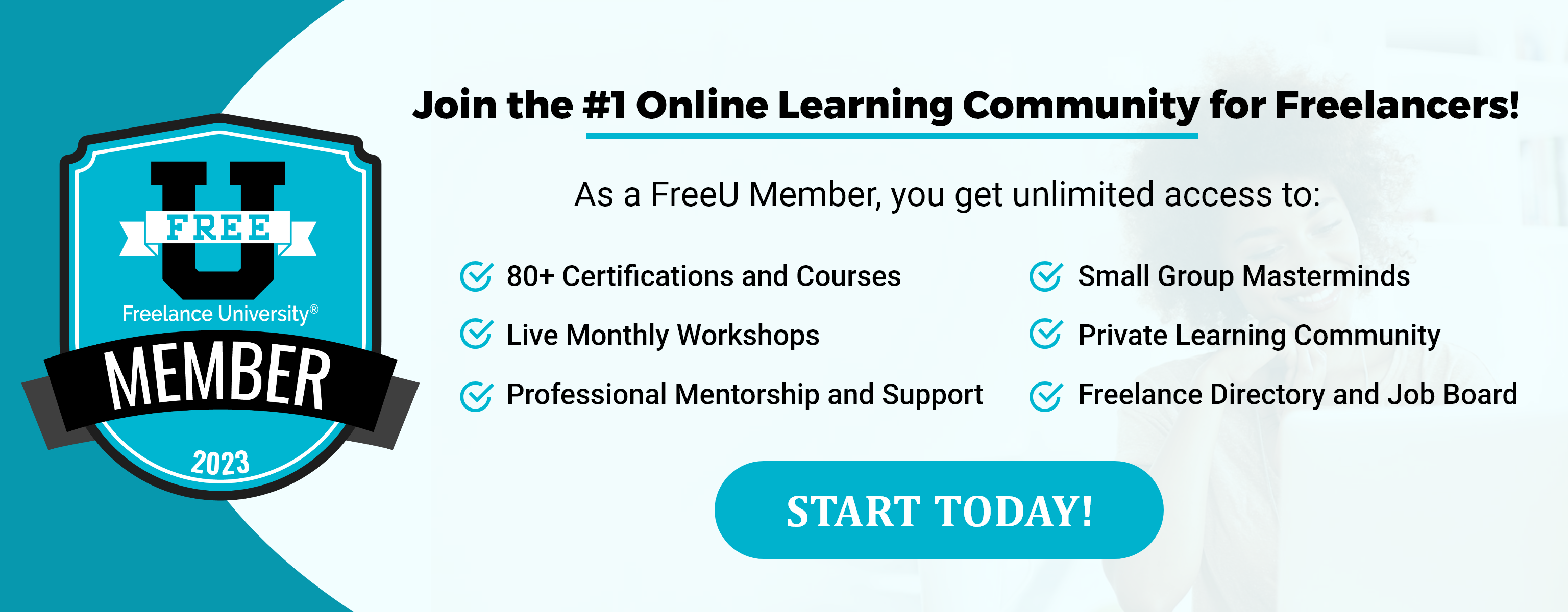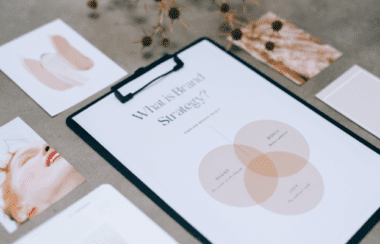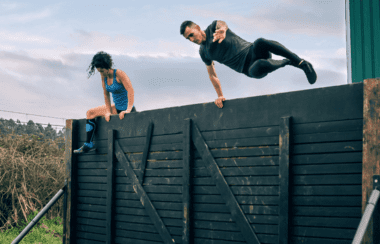The Fine Art of Learning New Skills for Your Freelance Business
By Jena Kroeker
Back in the 1990s, I didn’t know that I’d be a freelancer writing about the art of learning new skills. I was a part of Generation X, studying linguistics at a local university, contemplating the meaning of life with a cup of coffee in my hand and alternative rock music playing in the background. When people asked what I was going to “do” after university, I said, “I don’t know. I’m at university to learn how to think.”
People often predicted that my generation would have multiple careers. And that meant we would need to keep learning new skills throughout our lives.
Upwork CEO Stephane Kasriel confirms this prediction in an article titled “The future of work won’t be about college degrees, it will be about job skills.” In particular, he says, “Freelancers, the fastest-growing segment of the workforce, realize more than most that education doesn’t stop. It’s a lifelong process, and they are nearly twice as likely to reskill.”
According to the 5th Annual Report, “Freelancing in America 2018,” freelancers consider skills training even more valuable than a formal education:
“93% of freelancers with a four-year college degree said training was useful versus only 79% who said their college education was useful to the work they do now; and 70% of full-time freelancers participated in skills training in the past six months compared to only 49% of full-time non-freelancers.”
The report further states that these freelancers are seeking skills training in areas like business management, networking, and technology.
And there’s a fine art to learning new skills, no matter what niche you specialize in. To illustrate this process, I’m going to take you back to the 1970s. Think disco and bell bottom pants. But that’s not what we’re focussing on here.
This is the decade when I learned how to learn. At the age of four, my parents enrolled me in Romanian dance classes, sparking my lifelong love of dance. I performed in front of audiences for seven years as a child and then for several more as an adult.
When I think about how I used to learn a new dance for a performance, I find several elements that can also be applied to learning new skills for a freelance or virtual assistant business. It’s not enough just to know how to “do” something. It’s a multifaceted approach.
Here are 7 ways to succeed in the art of learning new skills:
1. Discover the greater context and the “big why” for learning new skills.
In an article titled “11 Characteristics of Successful Freelancers and Entrepreneurs,” Rikke Dam asserts,
“Passion, skills and success will most often go hand in hand. If you can’t resist improving upon your skills and work because you are passionate about what you do, you’re going to succeed.”
My Romanian dance instructor devoted his life to his art. His passion for dance and culture was contagious. And he was also strategic in his choice of choreography. He wanted our performances to entertain the audience and showcase our abilities. That combination of skill and passion was key. We enjoyed ourselves and wanted to learn more. New dances replaced older ones, giving us a chance to fine-tune our performance.
In your virtual business, a passion for your niche is key to ensure success as you add new skills to your repertoire. Consider the following questions:
• Will this new skill enhance my services and benefit my clients?
• Will it help me run my business more efficiently?
• Will I enjoy performing this skill?
• Will this skill replace an older, out-of-date skill, or will it build upon an existing one?
2. Observe experts modelling the skill correctly.
As a child standing backstage, my eyes were glued to the senior dancers performing. I wanted to imitate their style – the tilt of the head, the swirl of the skirts, the beautiful footwork… The list went on. It gave me a thirst for knowledge. How did they do that? How can I do that too?
When you identify a skill you’d like to learn for your business, seek experts you can emulate:
• Look for them on social media and follow their posts.
• Read articles and blog posts they’ve written.
• Listen to podcasts that feature them.
• Watch their tutorials on YouTube.
• Enroll in online courses.
Observation is key to creating goals and gaining perspective about a potential skill. It sets the standard for what type of quality and expertise you want to achieve.
3. Start off slow so you can develop the proper technique.
A key principle to learning quick movements is to start off slow and then speed up. In the dance world, those feet swiftly flying across the stage began as slow, deliberate movements patiently learned during practice. Otherwise, it would be easy to develop bad habits or incorrect technique. With time, muscle memory develops, and the speed can increase.
In the same way, it’s important to learn online skills and processes in a step-by-step manner:
• Don’t rush through courses and tutorials.
• Take your time going through each step so you can learn techniques accurately and efficiently.
• Ask questions about concepts you don’t understand.
It’s tempting to race through the steps, but paying attention to careful instruction will pay off in the end. You’ll perform the skill faster and more efficiently than if you rushed at the beginning.
4. Practice regularly.
When learning new skills, practice, repetition, and perseverance are crucial. At Freelance University, students have access to the FreeU Software Sandbox, where they can practice using online tools like Canva for Work, WordPress, Leadpages, ConvertKit, HaikuDeck Pro, Venngage, and Designrr. This type of practical application is essential for exploring techniques and developing confidence.
In our Freelance 101 course, FreeU co-founder and instructor, Craig Cannings, suggests creating a regular block of time to master your niche. If you’re taking a course to develop new skills, be sure to book time in your schedule to view lessons and practice. In a previous blog post titled “Your Guide to Optimizing Your Daily Productivity,” we discuss strategies to help busy entrepreneurs carve out more time during the day.
5. Once mastered, uncover your unique style and approach to enhance the skill.
In dancing, we call it stage presence. A group of dancers is onstage, doing the same steps, but the audience can’t help watching one dancer in particular. They scan the group, but their eyes keep returning to one person.
That’s how you can be a master of skills in your virtual business. Once you’ve learned the technique, think about how you can make it your own. How do you offer the skill to clients in a way that makes you stand out?
• If you’re a graphic designer, do you have an eye-catching style you’ve developed for infographics?
• If you’re a writer, do you excel as a storyteller in marketing copy?
• If you’re a web designer, do you have an attention to detail and passion for technology that instills confidence in clients?
Think about your niche and how you can make potential clients turn their eyes to you!
6. Apply the skill to real-life situations.
Moving practice from the dance studio to the theatre stage was the best way to hone our Romanian dance skills. Everyone got a little nervous before dress rehearsal. All of a sudden, reality hit, and we realized we’d soon be performing in front of an audience. Our senses sharpened, and we strived to achieve the proper technique.
In your own business, it’s important to move skills out of the sandbox and onto the stage. That way, you can give yourself a dress rehearsal and move forward with your business offerings.
• Apply the skill to your own business.
• Offer it as a service to your local network.
• Begin marketing it on your website and social media.
• Pull back the curtain, and unveil it to your target audience!
7. Never stop learning and updating current skills.
I recently corresponded with my fellow dancers from the ‘70s and ‘80s. They’re now instructing a new generation of dancers and carrying on the traditions we grew up with. Of course, I was excited to talk about the old days. But I was impressed to hear that they’re not just preserving old dances from the past. They’re also attending workshops to learn new choreography. They’re staying current and keeping up with the future of dance.
An article titled “10 Tips for Earning More as a Freelancer” shares some important advice for virtual business owners:
“As a freelancer, you should always be looking for ways to improve your offerings. While it may be tempting to get comfortable and stick with what you know, taking steps to refine your craft opens up exciting new possibilities. These days learning new skills is easier than ever, thanks to the internet. Many sites offer tutorials and lessons on virtually any topic. Beyond just learning online, you can also take local classes, find a business mentor, or teach a fellow freelancer your skill in exchange for learning theirs.”
With technology changing at breakneck speed, skills training is essential to stay current in today’s virtual industry. And the internet has provided opportunities to update skills in ways we never dreamed possible before. At Freelance University, we work hard to offer the most up-to-date certifications, courses, and workshops in areas like Social Media, Digital Marketing, Digital Media & Events, Content Creation & Management, Business Management, Technology Management and Web/Graphic Design.
The next intake of FreeU is coming up in September, and this is the perfect place to learn in-demand skills to grow your virtual business. The instructors and mentors will help you stay current and greet the future with confidence. We’re proud to provide live and on-demand courses that allow people all over the world to learn at their own pace, according to their own schedule.
We’d love to hear your thoughts on the fine art of learning new skills. As a freelancer or virtual assistant, how do you decide which skills you need to learn or update for your business?









































































































